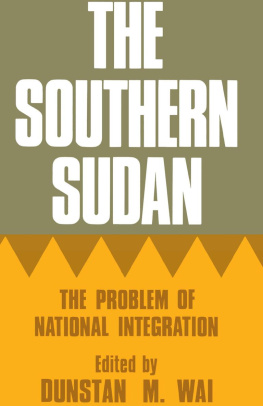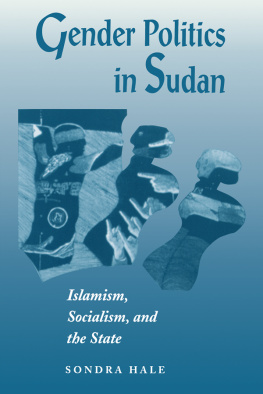Cover

| title | : | War of Visions : Conflict of Identities in the Sudan |
| author | : | Deng, Francis Mading. |
| publisher | : | Brookings Institution Press |
| isbn10 | asin | : |
| print isbn13 | : | 9780815717942 |
| ebook isbn13 | : | 9780585388182 |
| language | : | English |
| subject | Sudan--Politics and government--1985- |
| publication date | : | 1995 |
| lcc | : | DT157.5.D45 1995eb |
| ddc | : | 320.9624 |
| subject | : | Sudan--Politics and government--1985- |
Page i
WAR OF VISIONS
Page ii
Page iii
WAR OF VISIONS
Conflict of Identities in the Sudan
Francis M. Deng
THE BROOKINGS INSTITUTION
Washington, D.C.
Page iv
Copyright 1995
THE BROOKINGS INSTITUTION
1775 Massachusetts Avenue, N.W., Washington, D.C. 20036
All rights reserved
Library of Congress Cataloging-in-Publication data
Deng, Francis Mading, 1938
War of visions: conflict of identities in the Sudan / Francis M. Deng. p. cm.
Includes bibliographical references and index.
ISBN 0-8157-1794-6 (alk. paper): ISBN 0-8157-1793-8 (pbk. alk. paper):
1. Sudan Politics and government 1985- I. Title.
| DT 157.5. D 45 1995 |
| 32o.9624 dc20 | 95-26579 |
| CIP |
9 8 7 6 5 4 3 2 1
The paper used in this publication meets the minimum requirements of the American National Standard for Information Sciences Permanence of paper for Printed Library Materials, ANSI Z39.48 1984.
Typeset in Palatino
Composition by Graphic Composition, Inc.
Athens, Georgia
Printed by R. R. Donnelley and Sons Co.
Harrisonburg, Virginia
Page v
 THE BROOKINGS INSTITUTION
THE BROOKINGS INSTITUTION
The Brookings Institution is an independent organization devoted to nonpartisan research, education, and publication in economics, government, foreign policy, and the social sciences generally. Its principal purposes are to aid in the development of sound public policies and to promote public understanding of issues of national importance.
The Institution was founded on December 8, 1927, to merge the activities of the Institute for Government Research, founded in 1916, the Institute of Economics, founded in 1922, and the Robert Brookings Graduate School of Economics and Government, founded in 1924.
The Board of Trustees is responsible for the general administration of the Institution, while the immediate direction of the policies, program and staff is vested in the President, assisted by an advisory committee of the officers and staff. The bylaws of the Institution state: It is the function of the Trustees to make possible the conduct of scientific research, and publication, under the most favorable conditions, and to safeguard the independence of the research staff in the pursuit of their studies and in the publication of the results of such studies. It is not a part of their function to determine, control, or influence the conduct of particular investigations or the conclusions reached.
The President bears final responsibility for the decision to publish a manuscript as a Brookings book. In reaching his judgment on the competence, accuracy, and objectivity of each study, the President is advised by the director of the appropriate research program and weighs the views of a panel of expert outside readers who report to him in confidence on the quality of the work. Publication of a work signifies that it is deemed a competent treatment worthy of public consideration but does not imply endorsement of conclusions or recommendations.
The Institution maintains its position of neutrality on issues of public policy in order to safeguard the intellectual freedom of the staff. Hence interpretations or conclusions in Brookings publications should be understood to be solely those of the authors and should not be attributed to the Institution, to its trustees, officers, or other staff members, or to the organizations that support its research.
|
| Board of Trustees |
| James A. Johnson | Vartan Gregorian | David O. Maxwell |
| Chairman | Bernadine P. Healy | Constance Berry Newman |
| Teresa Heinz | Maconda Brown O'Connor |
| Leonard Abramson | Samuel Hellman | Samuel Pisar |
| Ronald J. Arnault | Warren Hellman | Rozanne L. Ridgway |
| Elizabeth E. Bailey | Robert A. Heiman | David Rockefeller, Jr. |
| Rex J. Bates | Thomas W. Jones | Judith S. Rodin |
| Kenneth W. Dam | James A. Joseph | Michael R. Schulhof |
| John C. Danforth | Breene M. Kerr | Robert H. Smith |
| D. Ronald Daniel | Thomas G. Labrecque | John D. Zeglis |
| Walter Y. Elisha | Donald F. McHenry | Ezra K. Zilkha |
| Stephen Friedman | Bruce K. MacLaury |
| Honorary Trwtees |
| Vincent M. Barnett, Jr. | Robert E Erburu | Donald S. Perkins |
| Barton M. Biggs | Robert D. Haas | J. Woodward Redmond |
| Louis W. Cabot | Andrew Heiskell | Charles W. Robinson |
| Edward W. Carter | Roger W. Heyns | James D. Robinson III |
| Frank T. Cary | Roy M. Huffington | Howard D. Samuel |
| A. W. Clausen | Vernon E. Jordan, Jr. | B. Francis Saul II |
| John L. Clendenin | Nannerl O. Keohane | Ralph S. Saul |
| William T. Coleman, Jr. | James T. Lynn | Henry B. Schacht |
| Lloyd N. Cutler | William McC. Martin, Jr. | Robert Brookings Smith |
| Bruce B. Dayton | Robert S. McNamara | Morris Tanenbaum |
| Douglas Dillon | Mary Patterson McPherson | John C. Whitehead |
| Charles W. Duncan, Jr. | Arjay Miller | James D. Woliensohn |
Page vi
Page vii
Foreword
Countries with a severe crisis of national identity confront serious dilemmas. On the one hand, identities, however determined, offer individuals and groups a basis for a deep sense of belonging, dignity, and security, especially when states fail to ensure protection and assistance. Identities can also provide building blocks for nationhood developed on the distinctive attributes of a group. On the other hand, nation building requires unity and a common sense of purpose, which should transcend factional or sectarian perspectives and interests. These challenging realities often come into conflict, ultimately endangering not only the collective interest of the country, but the factional interests of the parties as well.
Next page








 THE BROOKINGS INSTITUTION
THE BROOKINGS INSTITUTION